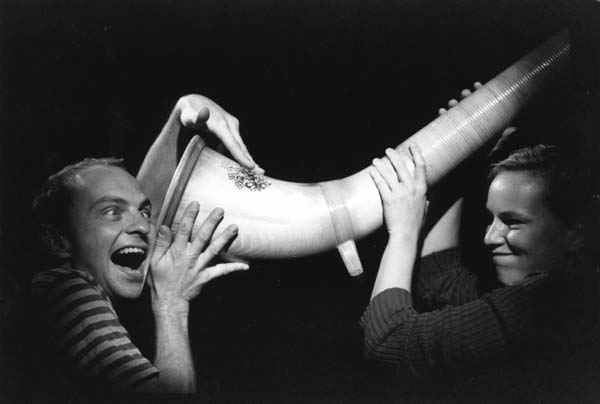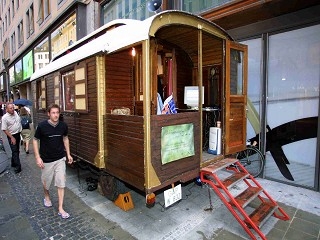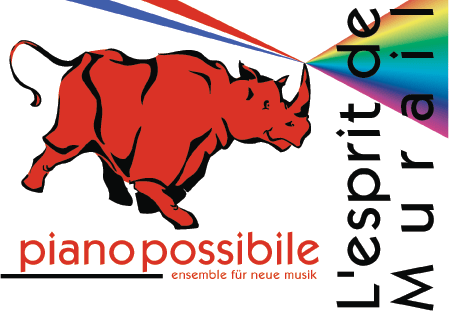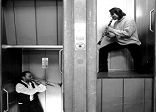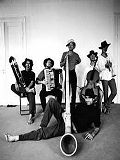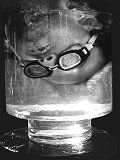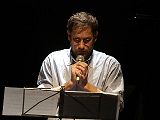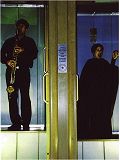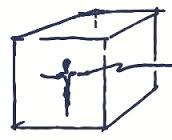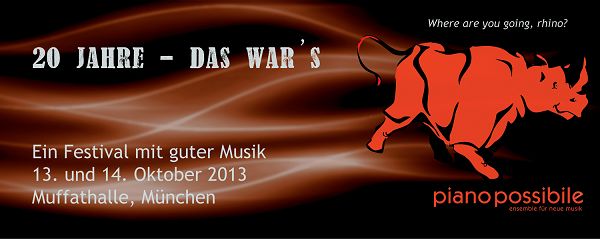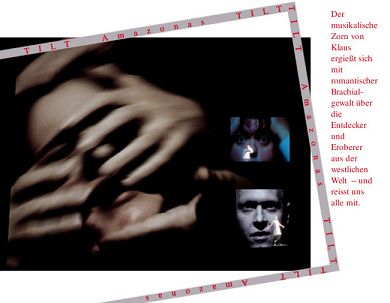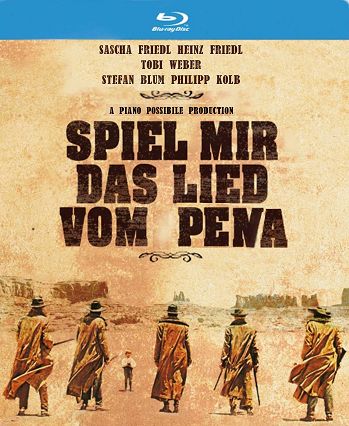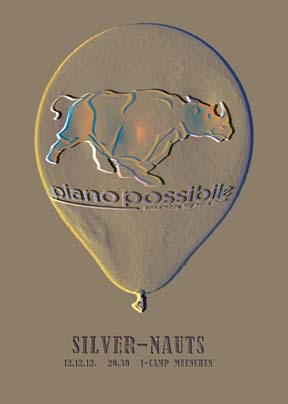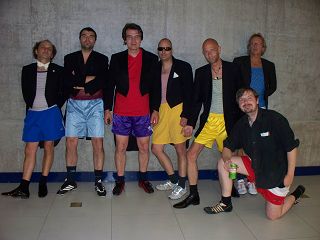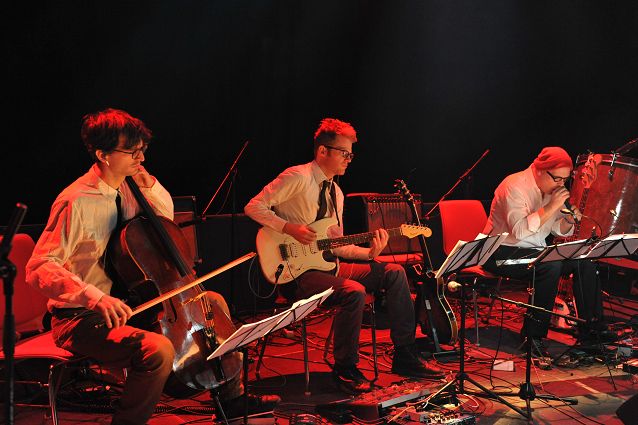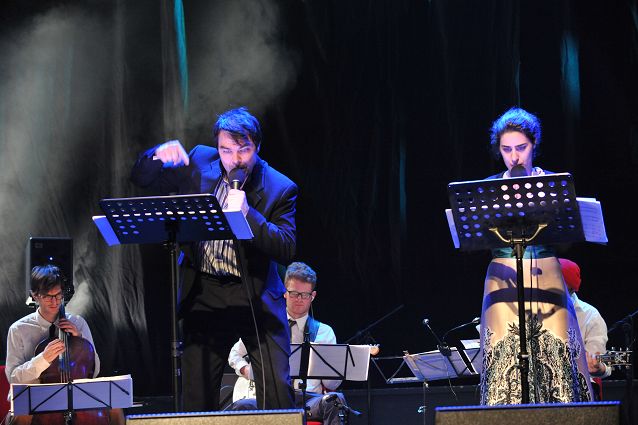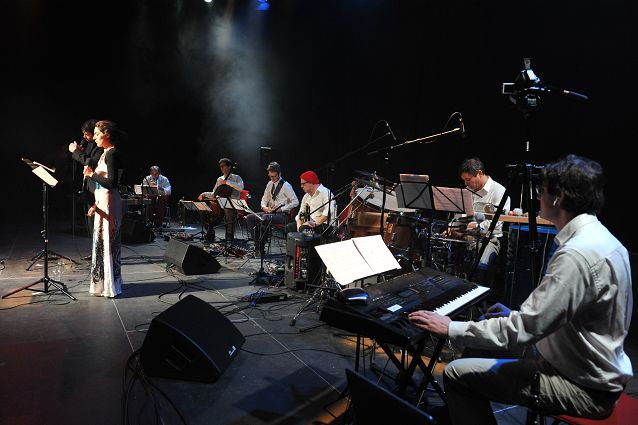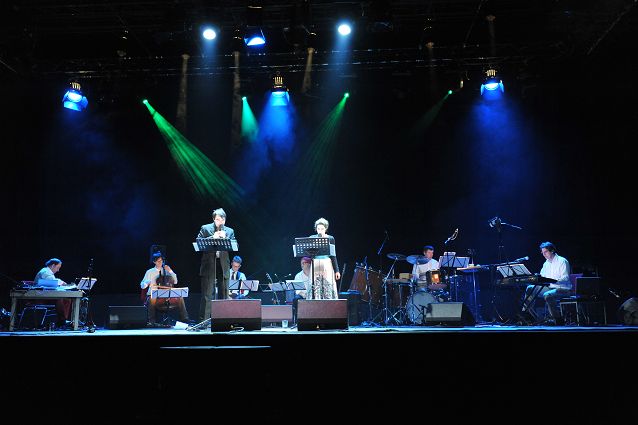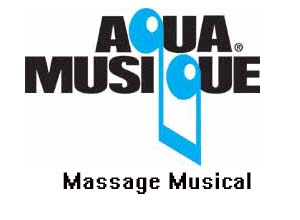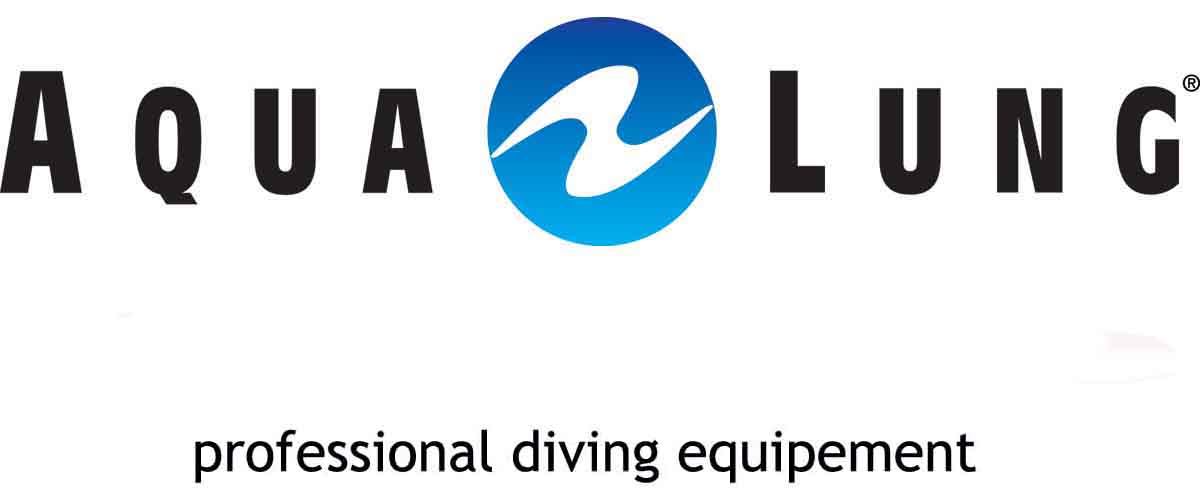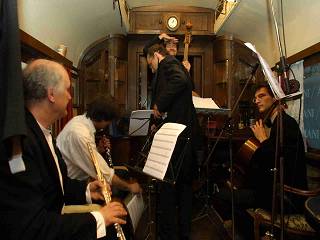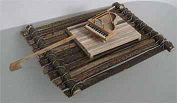|
|
|
|||||||||||||||||||||||||||||||||||||||||||||||||||||||||||||||||||||||||||||||||||
|
|
|
|||||||||||||||||||||||||||||||||||||||||||||||||||||||||||||||||||||||||||||||||||
|
2012|2012|2011|2010|2009| 2008| 2007| 2006 | 2005 | 2004 | 2003 | 2002 | 2001 | 2000 | 1999 | 1998 | 1997 | 1996 | 1995/942014special guests: on 27th of november at 8 pm in munich, pöllatstr. 11: Spontaneous Sound Adventures – SSA
GIESRIEGL-SCHINDLER-RADTKE (A/D)
Annette Giesriegl Stimme (Graz) Carsten Radtke E-Gitarre Udo Schindler Blasinstrumente
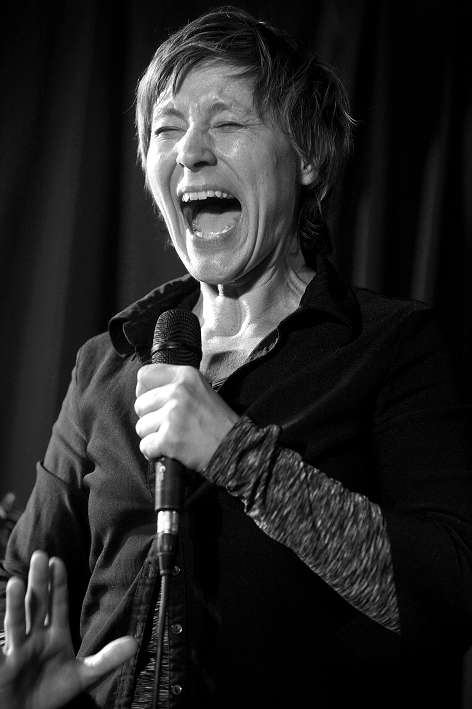 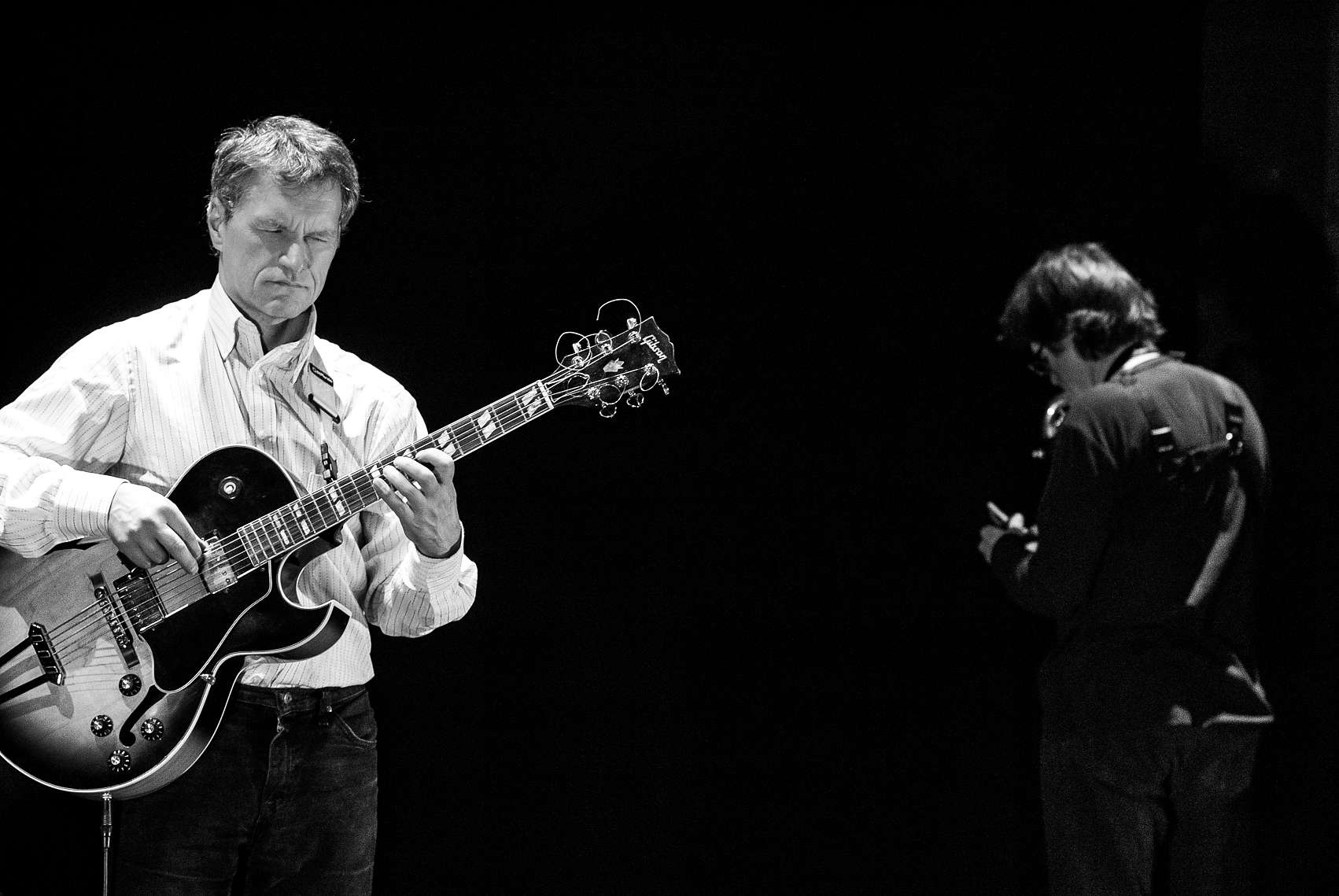 BAR 2.0 Season 2: The Baptism 19th august 2014 PöllatPavillion, Pöllatstrasse 11, München Obergiesing interactive-algorithmic-realtime music A club, which generates his own music. Sensors, software and humans are resonsibel for the sound, but: Dont kill
the DJ - cause it could be a suicide! realized by von piano possibile Programming, sensors and so on: Klaus Schedl, Georg Janker, Andreas Stabinger, Philipp Kolb Friendly supported by: Kulturreferat der Landeshauptstadt München Bayerische Staatsministerium für Bildung und Kultus, Wissenschaft und Kunst   de:
conducted music by Dieter Dolezel Projetstipendium der LH München First Night: More performances:
The communication between human and machine is a determiningfactor in
and Musiktheater from Detlev Glanert nach Elias Canetti Regie and conception: Nicola Hümpel First Night: Monday 19th of may, 8 pm Cuvilliés-Theater More performances: 22nd und 23thrd of may, just there conducted by: Heinz Friedl Stage: Oliver Proske actors:
Ensemble of the Residenztheaters and members from Nico and the
Navigators Ensemble piano possibile BAR 1.0 Season 1: Die Geburt Wednesday, February 26th 2014, 8.30 pm PöllatPavillion, Pöllatstrasse 11, München Obergiesing interactive-algorithmic-realtime music A club, which generates his own music. Sensors, software and humans are resonsibel for the sound, but: Dont kill
the DJ - cause it could be a suicide! realized by von piano possibile Programming, sensors and so on: Klaus Schedl, Georg Janker, Andreas Stabinger, Philipp Kolb Friendly supported by: Kulturreferat der Landeshauptstadt München Bayerische Staatsministerium für Bildung und Kultus, Wissenschaft und Kunst   2013
october 13th and 14th, 2013, Muffathalle, Munich
20 years - thats it piano possibile has Birthday...
Sunday,
13th 11.00
Uhr: Diskussionsmatinée
(canceld) mit Vertretern der Stadtpolitik, des Freistaates, der Presse und
Komponisten
zum Thema: Soll München sich ein Ensemble für aktuelle Musik leisten
(können). 18.00
Uhr: Opening 19.30
Uhr: Konzert „Im Frack" Gérard
Grisey ( Vortex temporum I, 1994 - 1996), Mark-Anthony
Turnage (On all fours, 1985), Riccardo
Nova (13X8@terror generating deity, 2010) Iannis
Xennakis (Palimpsest, 1979). 21.00
Uhr:
Gastkonzert
von
Hummmel
[und der Bär]
aus Umea mit Noise-Rock-Post-Punk-Bzzz Monday,
14th 19.30
Uhr: Konzert „Hope“ Klaus
Schedl (Sellbsthenker 2 – Durch die Wand ins Gehirn, 2012), Fausto
Romitelli (Prof. Bad Trip: Lesson 3, 2000), Bernhard Lang (DW 16 Songbook, 2005 – Ausschnitte)
Michael Gordon (Industry, 1993). 21.00 Uhr: Konzert „Future Now“ Alexander Schubert (Lucky Dip, 2013, UA), Luis Antunes Pena
(Vermalung 5, 2012), Marko Ciciliani
(Screaming my Simian Line, 2010) u.a.
Musicans::: Sascha Friedl (Fl, Keyb), Antje Thierbach (Ob), Jinni
Lee und Heinz conducters:: Carl
Christian Bettendorf und Heinz Friedl
Kindly supported by Kulturreferat der
LH München, dem Freistaat Bayern und dem
Muffatwerk Festival TransArt13september 15th, 2013, Naturns, Kraftwerk Schnals,
|
|||||||||||||||||||||||||||||||||||||||||||||||||||||||||||||||||||||||||||||||||||
2. Oktober, 20.00 Uhr |
|
|
We played "Les Fleurs du Mal" at the "Europäisches Zentrum der Künste Hellerau".
Les Fleurs du
Mal 
songs by Klaus Schedl click my for to hear
4. Februar 2011, Muffathalle, Munich
at the symposium "Neue Musik, neue Öffentlichkeit"
Live-electronic, computer-sounds and new instruments are
composed to a own kind of music, free of cobwebs and elitism.
A show full of power, passion and commitment
Süddeutsche Zeitung vom 6. Februar 2011
With Mafalda de Lemos, Sascha Friedl, Heinz Friedl, Philipp Kolb, Mathis Mayr,
Johannes Öllinger, Tobi Weber, Stefan Blum und Paolo
Mariangeli.
friendly supported by Kulturreferat der LH München

2010
infected by noise
5. Juli, 20.30 Uhr, i-camp, neues Theater München
8. Juli ZKM Karlsruhe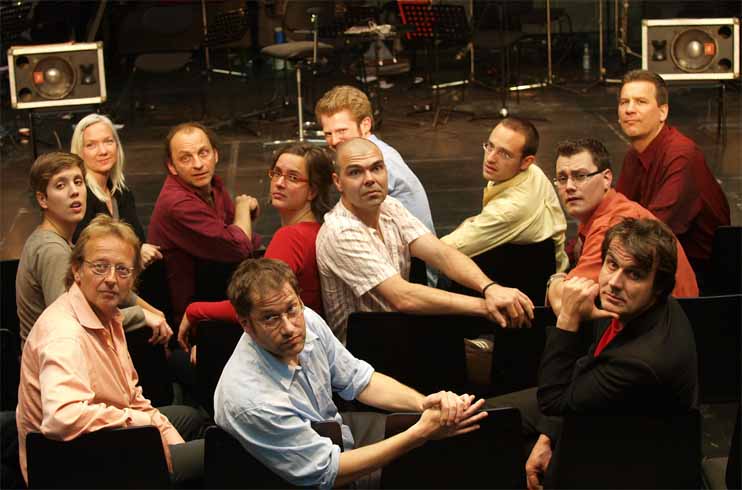
Konzertprogramm:
Emanuele Casale: Composizione pere voce sola
Michael Gordon: I buried Paul
Gilles Gobeil: Associations libres Version 1
Bernhard Lang: DW 6c
Klaus Schedl: Fleur Du Mal
Bernhard Lang: DW 16, Ophelia
Gilles Gobeil: Associations libres Version 2
Ensemble: Epiloge
friendly supported by Kulturreferat der LH München

ab 14. Juni 2010:
under water
a deprivation
of freedom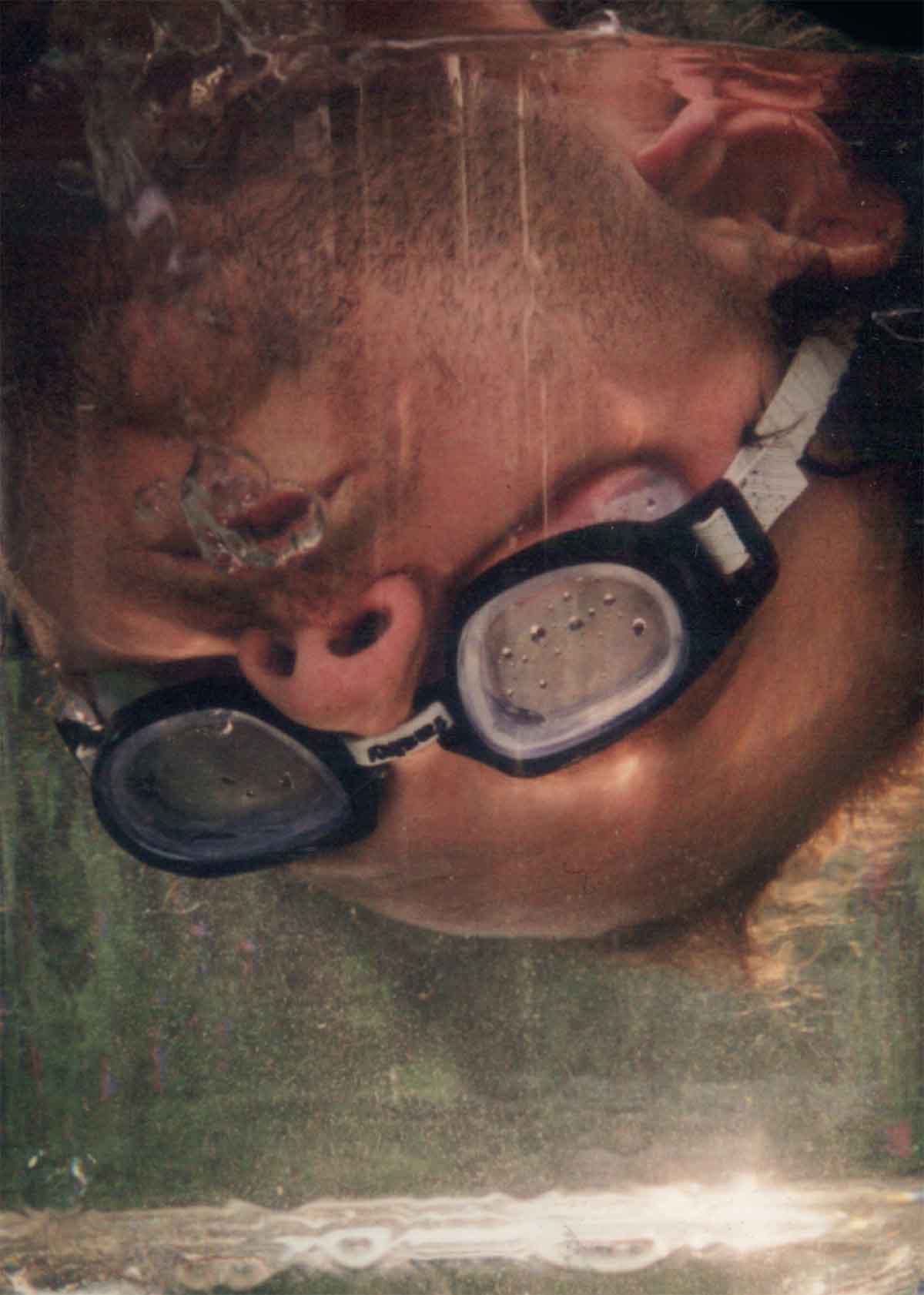
Firstnight on June 14th 2010, 8.30 pm in
Dante Freibad, Postillionstrasse 17, munich.
more shows on the 16th, 18th, 19th and 20 of june
construction: AKA Ingenieure, DiplIng Thomas Beck
light: Josef Wollinger and Strietzel Wollinger
video: Reiner Kienemann
sound and videodesign: trust your ears gmbh
with the Apnoe-team munich
dive-master: Uwe Grintsch
composition: Klaus Schedl, Philipp Kolb, Cornel Franz
production: Philipp Kolb, Cornel Franz, Klaus Schedl
directed by: Cornel Franz, Klaus Schedl, Philipp Kolb
special thanks to all the supporters:Kulturreferat der Landeshauptstadt München, Aqua Musique, AquaLung, the Dive Center Paradies and the M-Bädern der SWM (Stadtwerke München)

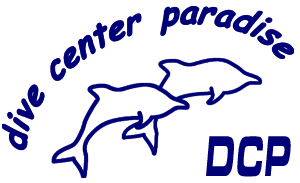
Münchener Biennale 2010:
Amazonas
Musiktheater in three parts
8. - 12. May 2010, Reithalle, München
A very interesting project with a totaly new kind of work: the musicans listen to audiosamples, which are generetad by a computer ( and the composer). These are the sounds we have to immitate.
see for more: http://www.muenchener-biennale.de/biennale_2010/program.php/de/amazonas/
music by Klaus Schedl, Tato Taborda and Ludger Brümmer
conductor: Heinz Friedl
with Sascha Friedl, Philipp Kolb, Mathis Mayr, Johannes Öllinger, Tobi Weber und Stefan Blum
Vorankündigung in der Süddeutschen Zeitung
Lang & Lang
Bernhard Lang: DW 16, Songbook, for Voice, Sax, Pft/Synth and Percussion
Bernhard Lang: DW 6c for E-Guitar, E-Bass and Drum-Set
19 März. 20.30 Uhr,
i-camp, neues theater München, Entenbachstrasse 37
Kartentelefon: 0049 89 65 00 00
friendly supported by Kulturreferates from the city of munich

2009
Bayerische Akademie der schönen Künste:
Zeitgenössische Kammermusik im Dialog:
Louis Andriessen
in Dialog with Siegfried MauserNovember 16th,
Louis Andriessen ( 1939): Klokken voor Haarlem (2002)
Michael Gordon (1956): I Buried Paul (1996)
Louis Andriessen Zilver (1994)
David Lang (1957): cheating, lying, stealing (1993)
Louis Andriessen Workers Union (1975)
conducted by Johannes Kleinjung
We a very happy to invite Mr Louis Andriessen to this concert. Further we are playing pieces from members of the New Yorker music-group "Bang On A Can".
In cooperation with Bayerischen Alkademie der schönen Künste und Kulturreferat der LH München.

In memoriam Dr. Reinhard Schulz
on October 20th, 8.00 pm
Gasteig, kleiner Kontertsaal
With TrioCoriolis and piano possibile
MGNM in cooparation with Hochschule für Musik und Theater München
September 25th 2009, 20.00
Kirche St. Martin
Klangspuren Schwaz/Tirol
Sabine Liebner and piano possibile:
a munich portrait
in memoriam Reinhard SchulzProgramm pp:
Markus Muench: Gap
Junktions ( Vc, Perc, E-Git)
Klaus Schedl:
Sepulture Fassung Ensemble ( Git, Klar, Tr., Voc, Vc, E-Bass)
Nikolaus Brass : Dialoghi d´amore IV (für Oboe, Klar, Tr,)
Josef Anton
Riedl: Duo für Percussion und Gitarre ( evtl Git + Perc)
Axel Singer:
Steinschlag
Moritz Eggert: There was a building
review in Tiroler Tageszeitung
An index of metals
by Fausto Romitelli
11.7. - 13.7.09, 8.30 pm, Munich,, Reaktorhalle, Luisenstrasse 37
A magma of sound, form and colour.
The story: Hypnosis, obsession and trance.
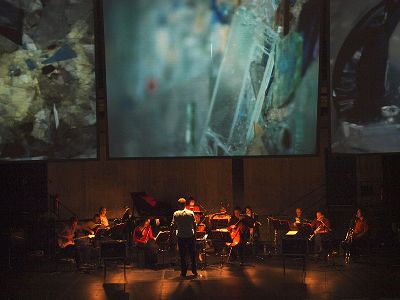
Foto: Regine Heiland
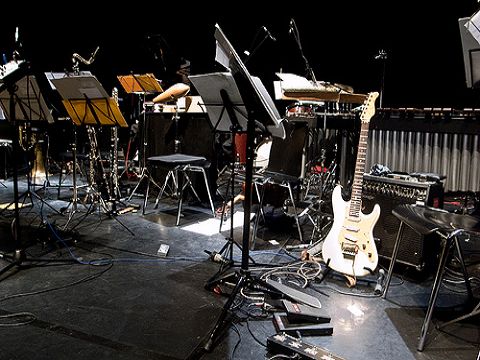
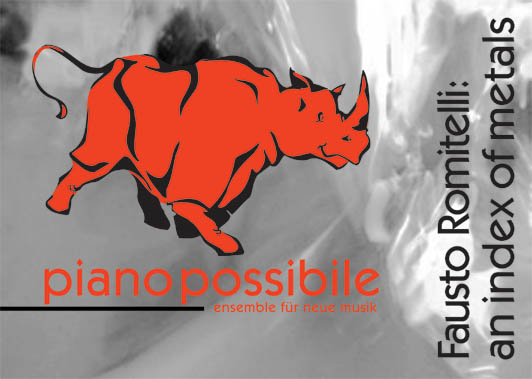
An index
of metals (2003) is the last work from the italian composer Fausto Romitelli, who died 2004.
In this video-opera his music and the videos from Paolo
Pachini
and Léonardo Romolli conflate to a unit.
Review in Süddeutschen Zeitung vom 16. Juli 2009
Preview in Klassikinfo (click)
conducted by Johannes Kleinjung
Anna Maria Bogner, sopran
Friendly supported by Kulturstiftung der Stadtsparkasse München, the Kulturreferat der LH München, Hochschule für Musik und Theater München and Freistaat Bayern
and special thanks toSilberstreifen 2
28th and 29th Mai 2009, 8.30 pm,
i-camp, neues Theater München, Entenbachstrasse 37
The essential concern of this concert is to investigate future-oriented developments of contemporary music which reflect the overcoming of the marginalization of contemporary music on an elaborated artistic level. Klaus Schedl’s new work represents a concertante continuation of this concept: the creation of a work which facilitates music in all its varieties and functions without submitting to the dichotomy of “serious” and “popular” music. This comprises the choice of formal principle, compositional technique, instrumentation as well as the actual way of performance.
Press in the Süddeutsche Zeitung
|
Studio 2a per flauto dolce basso e elettronica |
|
|
thirteen Intermediate für ensemble |
|
|
x-fach 1 für Oboe, Kontrabass, Klavier und Percussion |
|
|
DW 16 (Ausschnitte)( 1999) |
|
|
Neues Werk (UA) |
|
|
Gap Junktions Cello, E-Gitarre und Schlagzeug |
Friendly supported by Kulturreferat der LH München and
We have the biggest....Subwoofer. 45´´
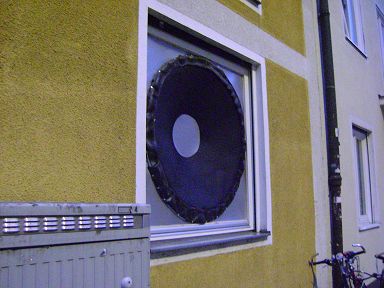
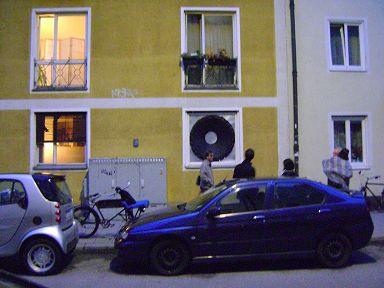
composition: Philipp Kolb
controler: Klaus Schedl and Philipp Kolb
a subsonic concert at 'angedacht.mai.erdgeschoss. einraumstück für die niederen bedürfnisse'
a project from entente cordiale - robert hofmann
supported bys i-camp & kulturreferat der stadt münchen
21. Mai 2009, Metzstrasse 9, München
SingSing
Chormusic from the 20th and 21st century
1. Februar 2009, 20.00 Uhr, Aula der Universität München
2. Februar 2009, 20.00 Uhr, Muffathalle München
The Universitätschor Munich and piano possibile in cooperation
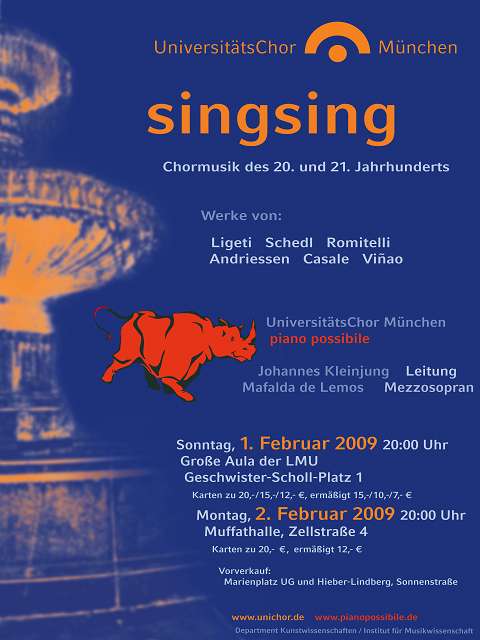
Programm:
Emanuele
Casale: Composizione
pere voce sola
Louis Andriessen:
Workers
Union in a version for chor and ensemble by Philipp Kolb
Fausto
Romitelli: Professor Bad Trip : Lesson
Two
Alejandro
Vinao: Epitafio
para Machado,
(4th movement from "Epitafios")
für
Chor und live-elektronik
Klaus
Schedl: Sépulture für Solostimme,
Chor, Ensemble und Elektronik
György
Ligeti: Lux aeterna
Mafalda de Lemos Mezzosopran
UniversitätsChor Munich
piano possibile
Conductor: Johannes Kleinjung
Friendly supported by Kulturreferat der LH München and
Who the fuck is Jager Gracchus?
Monotonien
eines Untoten,
Singspiel
von Alexander Strauch
mit Franz Kafkas Fragmenten zu
"Jäger Gracchus"Regie: Christina Ruf
15. Januar - 18. Januar 2009, daily 8.30 pm
i-camp /neues theater münchen, Entenbachstr. 37, 089/ 65 00 00
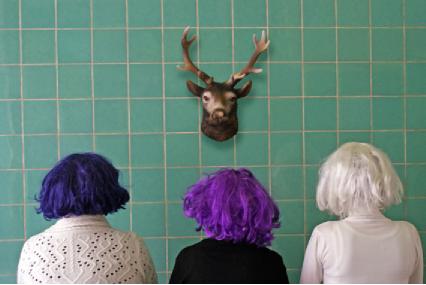
Norman Sonnleitner Kommentator
Heinz Friedl Clar, Philipp Kolb Trt/Tuba, Stephan Lanius Doublebass;
Lutz Weinmann Visuals; Rainer Ludwig Light; Peer Quednau Video-technic
Manuela Müller Stage;
Alexander Strauch: Composer and Conducter
Christina Ruf: Regie
friendly supported by Kulturreferat der Landeshauptstadt München
2008
NewmusiX 2
18. Dezember 2008, 23.00 Uhr - 1.00 Rote Sonne, Maximiliansplatz 5, München (conzert with piano possibile, modulatedworks by Georg Janker und Norbert Vollath and Clubsounds by Gebrüder Teichmann
19. Dezember 2008, 20.30 Uhr i-camp/neues theater münchen, Entenbachstr. 37, 089 65 00 00
Zeitgenössische Musik und Clubsound!
The Gebrüder Teichmann, Michaela Melián, Markus Muench and Philipp Kolb take a look at Fausto Romitelli "Trash TV Trance" for Guitar solo.
Guitar: Johannes
Öllinger, Trombone: Zoltan Hahner, Cello: Mathis
Mayr, Percussion: Stefan Blum, Voc: Mafalda de Lemos
directed by Heinz
Friedl
Supported by city munich / Kulturreferat
pp goes Brazil:
"Mostra SESC de Artes"
Sao Paolo, Brasilien
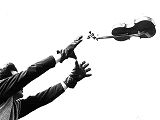
Ensemble Finale
Live-Improvisation zu Fußballspielen:
14. and 15. Oktober 2008
SESCSP Vila Mariana
O grupo improvisa durante os noventa minutos de uma partida de futebol exibida num telão. O andamento da música é definido pelo andamento da partida; música e imagem juntam-se para acrescentar mais emoção ao jogo. Ensemble Finale foi realizado durante a Copa do Mundo de Futebol de 1998, de 2002 e de 2006, e durante a Eurocopa de 2000 e de 2004. O concerto tem concepção e direção de Philipp Kolb.
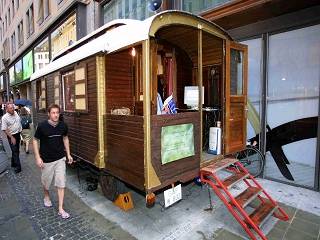
EU COMPONHO A PARTIR DE SUA MÃO
(Ich Komponiere aus Ihrer Hand)
16. - 19. Oktober
On the streets of Sao Paolo
Um trailer estacionado no meio de uma rua movimentada abriga um compositor que
convida alguém para entrar. Dentro dele, a pessoa é entrevistada pelo
compositor. Essa conversa é gravada, e servirá de base para a criação de uma
música definida pelo andamento da entrevista. Numa parte separada do trailer, a
obra é executada por cinco músicos ocultos. Ao final, o entrevistado leva para
casa a sua música em CD.
Preços de portaria.
With Mafalda de Lemos, Heinz Friedl, Philipp Kolb, Martin Wolfrum und Anno Kesting
Komposition-algorithmen: Klaus Schedl
Regen aus der Erde
a music/theater project from Klaus Schedl und Cornelie Müller
Report from von Roland HH Bißwurm in Bayerischen Rundfunk, Kulturwelt, B2
Report from Ulrich Möller-Arnsberg im Bayerischen Rundfunk Bayern 4 Klassik Allegro
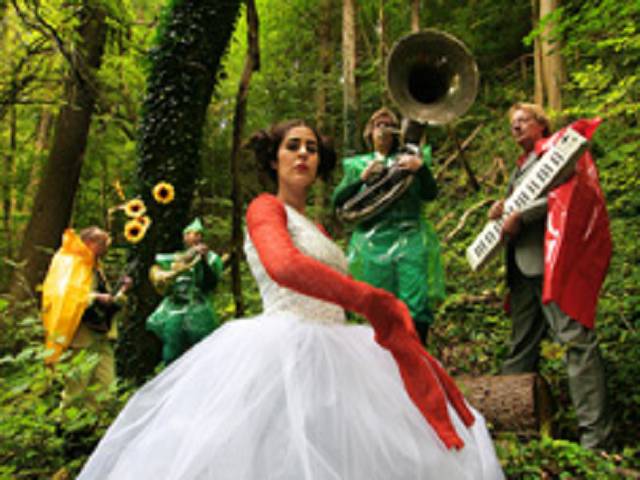
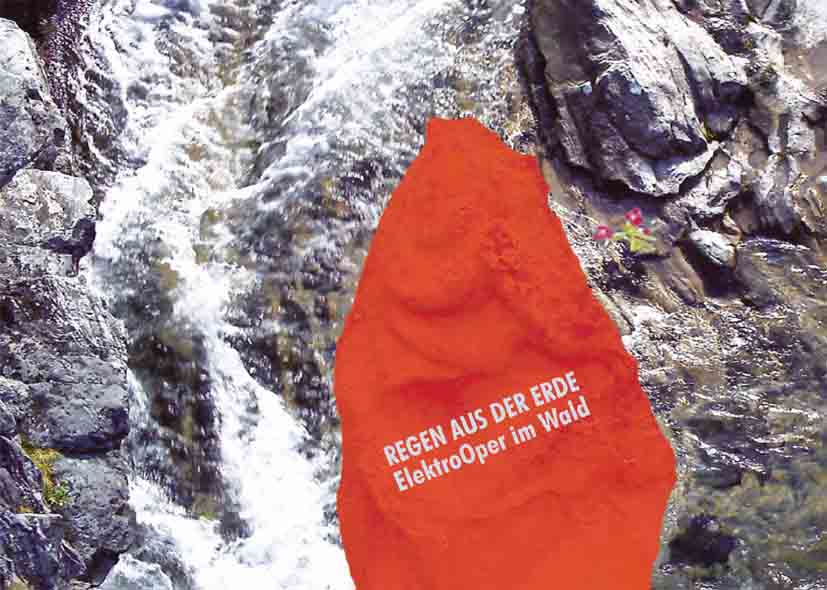
30. September - 3. Oktober
Au-Wald rechts der Isar nähe Neu-Grünwald
composition & conzeption: Klaus Schedl
Direktion & conzeption: Cornelie Müller
Light: Michael Bischoff
Produktion: piano possibile
Pit Holzapfel - E-Guitar ·
Andreas Koll - Sousaphon ·
Wolfgang Schönwetter - Horn ·
Martin Wolfrum - Piano ·
Heinz Friedl - musical director
Musik steht hier nicht nur für ein ästhetisches Empfinden sondern schafft eine Situation der Wahrnehmung von konkreten Ereignissen und Gefühlen wie Angst und Ausgesetztheit. Andrerseits wird Musik in Waldmusik als Zeichen der Geborgenheit verstanden und herausgearbeitet. Musik ist: bei sich sein.
Die Inszenierung nutzt die natürliche Umgebung und deren Bedingungen (Wald, Steilhang, Felsen, Höhlen, Dunkelheit, Feuchtigkeit) und schafft mit Licht, Projektion und unnatürlichen Materialien einen Erlebnisraum, der fremdartig und doch vertraut anmutet
Im Rahmen der Ausschreibung Kunst hören - Musik sehen
www.ortstermine-muenchen.deNewmusiX I
24. Juli, 23.00 Uhr Rote Sonne, Maximiliansplatz 5, München (mit anschließendem Clubabend mit den Gebrüdern Teichmann und Christian Prommer)
25. Juli 20.30 Uhr i-camp/neues theater münchen
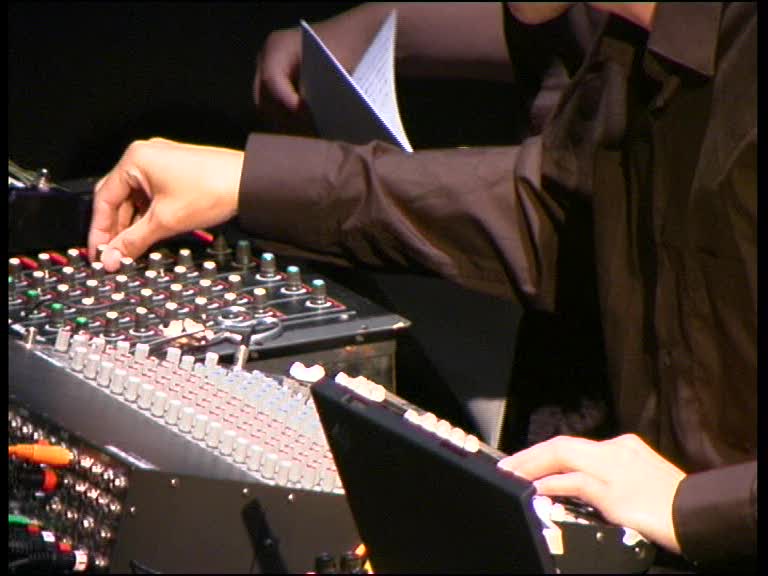
Clubsound meets contemporary music
The Gebrüder Teichmann, Christian Prommer , Markus Schmitt and Axel Singer take a look to the piano-quintet "AMADÉ, AMADÉ" by Moritz Eggert.
Supported by
Press Süddeutsche Zeitungmusic in action
A concert by the MGNM
30. Juni 2008, 18.00 Uhr . "Schwere Reiter", Dachauerstrasse 114
Stephan Lanius: Eos und Thitonos
Alexander Strauch: Differenzen zu Dritt
Nicolaus Richter de Vroe: Zu Fuß nach Island
Christoph Reiserer: Saxophonduett
Klaus K. Hübler: Zeitung
Nikolaus Brass: Jetzt/Ich ( UA der Neufassung)
fluX 2008
26. Juni, 10.00 – 23.00
Eine river-rafting-tour (Wolfratshausen-Thalkirchen) + concert
Alternative date in case of high water: 3. Juli.
With the raftsmen from von piano possibile
Supported by
Ortstermine - Kunst hören, Musik sehen
Schubert - stay friends
30. Mai 2008, 20.30 Uhr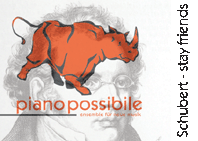
i-camp - neues Theater München
As many others piano
possibile can’t help being fascinated by Franz Schubert and his music: the
composer Christoph Reiserer designed a program conception which investigates
Schubert’s influence on contemporary music.
The concert focuses on the
Adagio in the piano trio DV 897. The
compositions of Feldmann, Grisey and Reich are all working with Schubert’s
typical techniques without directly referring to him: repetition of patterns,
minimalism, harmonics based on harmonic series, a narrative-linear structure.
The first performance of
Christoph Reiserer’s new work brings another aspect of Schubert’s music to
mind: human nature beyond intellect.
In the new work Schubert’s method of creating an instrumental work on the basis of a song composition is going to be reversed. The human voice and beyond that – as in many of Reiser’s compositions – a physical approach to the instruments is incorporated into the instrumental composition. By overcoming the intellect voice and body are leading to a human being beyond rationality.
|
Morton Feldmann |
Three Clarinets, Cello and Piano (1971) |
|
Steve Reich |
New York Counterpoint (1995) |
|
Gerard Grisey |
Vortex Temporum I (1996) |
|
Franz Schubert |
Adagio DV 897 |
|
Christoph Reiserer |
Erwartung. Wunsch. Etc. (2008) UA Mezzosopran, 3 Klar, Vc, Klav |
|
Christoph Reiserer |
Bearbeitung von Schuberts Adagio ( DV 897)
(2008) |
|
|
|
Verhört?
21. Mai, 20.00 Uhr
München, Giesinger Bahnhof Kunstbahnsteig
Composer in dialog: Alexander Strauch,
organized by Münchner Gesellschaft für Neue Musik
Und wenn wir dann so weit sind, können wir anfangen
1. Mai – 3. Mai
Chanber-opera in a office from Cornelie Müller and Christoph Reiserer
Gastspiel in Weiden
Silberstreifen
18. Januar 2008, 20.30 Uhr, i-camp
Conducted by Heinz Friedl
The essential concern of this concert is to investigate future-oriented developments of contemporary music which reflect the overcoming of the marginalization of contemporary music on an elaborated artistic level. Klaus Schedl’s new work represents a concertante continuation of this concept: the creation of a work which facilitates music in all its varieties and functions without submitting to the dichotomy of “serious” and “popular” music. This comprises the choice of formal principle, compositional technique, instrumentation as well as the actual way of performance.
Konzertprogramm
|
Iannis Xenakis |
Charisma (1971) |
|
Carola Bauckholt |
Treibstoff (1995) |
|
Fausto Romitelli |
Professor Bad Trip: Lesson III (2000) |
|
Bernhard Lang |
DW 16 (Ausschnitte)( 1999) |
|
Alejandro Vinao |
borges y el espejo (1992) |
|
Klaus Schedl |
Fleurs |
|
|
|
2007
Cornelie Müller:
Und wenn wir dann soweit sind, können wir anfangen
l
Premiere: 10. Dezember 2007 · 20:30
more Performances on 11.-14., 16., 17. december · 20:30
Euro-Trainings-Centre ETC e.V.
Sonnenstraße 12 II. Aufgang 5. Stock · 80331 München
Kammeroper im Büro
Francis Poulenc’s Tragédie en un acte - LA VOIX HUMAINE (a telephone monologue for one female singer and orchestra based on a text by Jean Cocteau, first performance 1959) was going to be performed in an arrangement for chamber orchestra by Christoph Reiserer. The project wasn’t given the necessary arrangement and performing rights. As a result the situation was apprehended and functionalized as a challenge to create a new, contemporary music theatre.
with Rose Bihler Shah voice, Heinz Friedl clarinets, Ute Hagelstein
Viola, Philipp Kolb trumpet, Anna Khubashvili Cello, Birgit Otter
Violin, Christoph Reiserer Harmonium, Nici Walde bassoon.
Musik: Fragmentarische Kompositionen von Christoph Reiserer
mit Improvisationen des Ensembles
Musikalische Leitung Heinz Friedl
Licht Michael Bischoff
Ausstattung & Kostüm Claudia Karpfinger
Text & Inszenierung Cornelie Müller
Pressearbeit Karin Platzer
Produktion Büro für Angelegenheiten
in Zusammenabreit mit piano possibile und
mit Unterstützung des Kulturreferats der LHSt München
Klangspuren Plus
Carl Christian Bettendorf in dialog with Siegfried Mauser
Gesprächskonzert der Münchener Biennale
Mittwoch, 10. Oktober 2007, 20 Uhr
Black Box im Gasteig
|
Claude Debussy |
Cloches à travers les feuilles aus Images II für Klavier solo |
|
Edgar Varèse |
Density 21.5 |
|
Igor Strawinsky |
3 Stücke für Klarinette solo |
|
Hans-Jürgen von Bose |
Drei Studien |
|
Harrison Birtwistle |
Linoi für Klarinette und Klavier |
|
Tristan Murail |
Feuilles à travers les cloches (1998) |
|
C. C. Bettendorf |
Three Anniversaries |
L'esprit de Murail
28. Juni 2007, 19 Uhr
Vortragssaal der Bayerischen Akademie der Schönen Künste München
Tristan Murail (* 1947)
Winter Fragments (2000)
Seven Lakes Drive (2006) Deutsche Erstaufführung
Feuilles à travers les cloches (1998)
Marc-André Dalbavie (*1961)
In Advance of the Broken Time... (1994)
Olivier Messiaen (1908-1992)
Ausschnitte aus
Quatuor pour la fin du temps (1944)
Oliver Schneller (*1966)
This is what I am seeing here... (2005)
In cooperation with the Bayerische Akademie der Schönen Künste and A•Devantgarde e.V.
Supported by Kulturreferates der Landeshauptstadt München
Siegfried Mauser in conversation with Tristan Murail
Together with Gérard Grisey Murail established
the so-called “spectral music”. Apart from that the elegiac
Winter Fragments, which were written as a memento of his early deceased
friend and colleague, there are two more works for chamber ensemble on
the program which function as a trajectory to his latest work –
Seven Lakes Drive – which is performed for the first time in
Germany.
Works by two of Murail’s students are representing
a counterbalance to his own works: Marc-André Dalbavie who
studied with him at the IRCAM in Paris and Oliver Schneller who
belonged to the first generation of Murail’s students at Columbia
University, New York and now lives in Berlin. Excerpts of Olivier
Messiaen’s chamber musical masterpiece Quatuor pour la fin du
temps remind of the fact that Murail once was a student of Messiaen at
the Paris Conservatoire.
2006
Schönberg Revisited
Donnerstag, 14. Dezember 2006, 20 Uhr
Muffathalle München
Arnold Schönberg (1874-1951)
Drei Stücke für Kammerorchester (1910)
Alexandre Lunsqui (*1969)
AREIA (2006) Auftragswerk, UA
Nicolaus Richter de Vroe (*1955)
in ruhe : un ruhe (2006) Auftragswerk, UA
Alexander Strauch (*1971)
Servas Arnold (2006) Auftragswerk, UA
piano possibile
Conductor: Carl Christian Bettendorf
For this project piano possibile received an advancement award by the Ernst von Siemens Music Foundation
When Arnold Schönberg was writing his Three Pieces for Chamber
Orchestra in 1910, he and his students Alban Berg and Anton von Webern
had only just left the safe haven of tonality. Although having been
prepared since Wagner’s Tristan’s chord the step into the
no man’s land of so-called atonality (or – as
Schönberg more precisely formulated – “free
tonality”) still turned out to be extremely difficult. For the
three composers appearing here this factor initially resulted in an
extremely reduced, fragmentary style with very short pieces. It seems
as if the newly found freedom had made them literally speechless in the
first place.
Veranstalter: piano possibile e.V. in Zusammenarbeit mit dem Kulturreferat der LH München und der Muffathalle Betriebs GmbH
Augenmerke
16. Juli 2006
Musikinstrumentensammlung im Münchener Stadtmuseum
For his 70th anniversary the Ensemble für Neue Musik piano possibile presents Munich composer Anton Ruppert with a musical bouquet of his own works. His colleagues, the composers Peter Kiesewetter and Alexander Strauch, contribute own works.
Anton Ruppert:
Musik nach einer Katastrophe (1994)
Fl, Kl, Asax, Vl, Vla, Vc, Perc, Pno
Augenmerke (2000)
Kl, Perc
Schwanenmelodien (2004, UA)
Va, Perc
Alexander Strauch:
5und7 PLUS 5x7 (2006, UA)
Fl, Bkl, Vl, Va
Peter Kiesewetter:
Sphinxes op.100
Kl, Pno, Vl, Vc
Conductor: Christian Günther
Veranstalter: piano possibile e.V. in Zusammenarbeit mit dem
Kulturreferat der LH München und dem Münchener Stadtmuseum
Next Generation
17. März 2006, 20 Uhr, Kleine Schloßberghalle Starnberg
25. März 2006, Muffatwerk Ampère München
Carl Christian Bettendorf (*1973)
Inner Life für Ensemble (2004-05)
David Brynjar Franzsonf (*1978)
Il dolce fare niente (2004)
für Klarinette, Violine, Cello und Elektronik
Oliver Schneller
Aqua Vit für 8 Instrumente
Benjamin Schweitzer (*1966)
Malbork I für 6 Spieler (1999)
Johan Tallgren (*1971)
Calla (1997-2000)
Marcelo Toledo (*1964)
Resplandecencias de la nada für 7 Spieler (2002)
Leitung: Christian Günther
Veranstalter: piano possibile e.V. in Zusammenarbeit mit dem
Kulturreferat der LH München und der Muffathalle Betriebs GmbH
When the ensemble piano possibile was founded in 1993 half of its members were composers. Although in the meantime this has severely changed – mainly because of the personnel expansion of the ensemble – the contact especially with the young generation of composers is still playing a central role in the artistic work of the group. A part of the composers in this concert – all of them in their twenties and thirties and about to start an international career – have hardly or not at all been played in Munich or even the whole of Germany whereas they succeeded in attracting lasting attention elsewhere, as f.e. the Argentinean Marcelo Toledo with a commissioned work for the Ensemble InterContemporain or the Finn Johan Tallgren with a portrait concert dedicated to him at the Musica Nova Festival in Helsinki last March. Benjamin Schweitzer has been managed by Schott-Verlag for some time now; his work was performed at the Luzern-Festival and the Berliner Festwochen. Oliver Schneller’s commissioned work for the Timée, a newly developed electro-acoustic surround sound system, had its much-noticed first performance last year at the IRCAM in Paris.
2005
10 Jahre Münchner Gesellschaft für Neue Musik
Muffathalle München
07. und 08. Oktober 2005,
Freitag, 7. Oktober, 22:15 Uhr
Konzert mit Uraufführungen
Nikolaus Brass für das Saxofonquartett Le Fou Rohr (Besetzung: 4 Saxofone)
Manfred Fleischmann für das Münchner Flötentrio (Besetzung: 2 Flöten, Klavier)
Karl F. Gerber für die Microoper München (Besetzung: Frauenstimme, Disklavier, Computeralgorithmen)
Stephan Lanius für das Ensemble piano possibile (Besetzung: 5 Instrumentalisten)
Christoph Reiserer für das XSEMBLE München (Besetzung: Streichquartett und Disklavier)
Norbert R. Stammberger für das Münchner Flötenduo (Besetzung: 2 Flöten)
Samstag, 8. Oktober, 15:30 Uhr
u.a. Michael Hirschbichler Logion 77 für Flöte und Oboe
David Eschmann Flöte, Dietrich Schmidt Oboe
piano possibile spektral
Black Box im Gasteig, München
21. und 22. Juni 2005, 20 Uhr
Tristan Murail:
Winter Fragments (2000)
für Ensemble und Elektronik
Jonathan Harvey:
Tendril (1987)
für 11 Instrumente
Gérard Grisey: aus „Les espaces acoustiques“
Prologue (1976)
für Viola
Périodes (1974)
für sieben Musiker
Leitung: Carl Christian Bettendorf und Christian Günther
In 1974 Gérard Grisey outlines the preconditions for his future
compositions with his Périodes for seven players. In the
following year Grisey’s colleague Hugues Dufort equips the new
idea with the obligatory label in an essay entitled “Spectral
Music”. The concert of the ensemble piano possibile unites three
prominent representatives of this stylistic direction and represents a
concentrated review of its development from Grisey’s classic up
to the onset of the new millennium. At first, Périodes was just
the beginning of a large-scale cycle of works in which Grisey
investigated the newly discovered “acoustic spaces”. Up to
1985 Les espaces acoustique expanded to six parts which might as well
be performed separately or successively in subgroups. The
instrumentation of the cycle accumulates from viola solo to large
orchestra, the end of each part anticipating the beginning of the
following
Es lebe der Sport
Lichthof der Hochschule für Musik und Theater
04. und 05. Juni 2005,
Es lebe der Sport
Ein schweißtreibendes Spektakel für Sänger, Schauspieler und Musiker
Percussionists stemming barbells, boxing violins –
the guitarist climbing a steep face and the conductor doing his rounds
… The clock ticks – Who’s going to make it?
Konception and organisation: Moritz Eggert, Helga Pogatschar
The sportsman – a hero. The stadium – venue
of “sublime drama”, of collective national events uniting
all classes – mostly in front of the TV screen. Sitting on the
couch the spectator participates in a modern “Greek”
tragedy: the moment of truth has come – no other place can turn
you from a hero of the nation into its scapegoat within seconds.
In cooperation with Cornel Franz and ther August-Everding-Theaterakademie, Hochschule für Musik und Theater
Ensemble „piano possibile“ ( conducted by
Helmut Nikolai); Sänger der Opernschule; Schauspieler der
Schauspielklasse, Regie/Konzept: Ulf Goerke/ Nilufar Münzing,
2004
Geburtstagskonzert für Klaus Huber
Muffathalle München
17. November 2004, 20 Uhr
On the 30th November Swiss composer Klaus Huber is going
to turn eighty. As a pugnacious political spirit he remained young at
heart, though. His compositional work also still reflects an amazing
and always surprising development. In the attempt to draw a parallel in
music history, Giuseppe Verdi would come to one’s mind who also
found artistic inspiration in his political engagement and set off for
new musical shores by composing Otello and Falstaff when he was already
in his eigthies.
Alongside Huber’s wife Younghi Pagh-Paan, Brian Ferneyhough and Wolfgang Rihm appear as musical congratulators.
Klaus Huber (*1924)
L'ombre de notre âge (1998/99)
Ein Hauch von Unzeit III (1972)
Wolfgang Rihm (*1952)
Pol (1995)
Younghi Pagh–Pan (1945)
U–Mul (1991/92)
Brian Ferneyhough (1943)
Flurries (1997) für das Ensemble Contrechamps
siehe auch:
www.klaushuber.com
Veranstalter: piano possibile in Zusammenarbeit mit der Muffathalle
Betriebs GmbH und dem Kulturreferat der Landeshauptstadt München
[mu'si:k] MADE IN MÜNCHEN
Muffathalle München
3. Februar 2004, 20:30 Uhr
Struktur-Wellensittich
von Klaus Schedl
Music for 10 musican and two birds.
„In everyday life we are surrounded by a lot of acoustic phenomena.
We perceive them as noise, sound or even music.
We interpret the song of a budgie as a more or less
structured chronological sequence. It isn’t music – it
isn’t noise.
This piece aims at making the incomprehensible language
of the bird (it could be any other non-musical structure) accessible to
the audience. During the life performance music and musicians function
as a kind of simultaneous translator. As a compositional solution I
create a place holder score within which the musicians react to the
bird. Repetition, imitation, rhythmic labyrinths and spectral-harmonic
variety are the main compositional elements.”
Tagtäglich sind wir von vielen akustischen Vorgängen umgeben.
Wir nehmen sie als Geräusch, Klang oder sogar als Musik wahr.
Den Gesang eines Wellensittiches deuten wir als einen mehr oder weniger
geordneten zeitlichen Verlauf. Nicht Musik - nicht Geräusch.
Klaus Schedl: Komposition
Eine Veranstaltung der Freien Musikszene München in Zusammenarbeit
mit der Münchner Gesellschaft für Neue Musik e.V. und dem
Kulturreferat der LH München.
Mit Unterstützung der Muffathallen Betriebs GmbH
2003
Pater Noster Konzert II
Städtisches Hochhaus, München
6. und 7 November 2003
Mit Kompositionen von Heinz Friedl, Klaus Schedl und Philipp Kolb
The project “Paternoster Concert“ is an offspring of our
concert series “Musik findet Innen Stadt” which is based on
the idea of performing contemporary music away from the conventional
concert hall. The constant shifting of the performing positions and the
almost endless number of “stages” turn this concert into a
completely new acoustic and scenic experience: it is planned to
organize a concert with three pieces of contemporary classical music
being especially conceived for the building and the lift in the
municipal tower block in Blumenstraße. 10 musicians/actors are
going to perform in the paternoster cabs. However, there’s also
going to be music from the loudspeakers being spread over the whole
building which means that the musicians’ activity is not
restricted to their cabs. The audience can take part in the concert on
three levels thus making various sound experiences.
Generously supported by the Cultural Foundation of the Stadtsparkasse Munic
10 Jahre piano possibile
Muffathalle München
21. September 2003
Ablauf des Abends:
17.30 Ich komponiere aus Ihrer Hand (im Freien)
18.30 Improvisationen und Raummusik (in der Halle)
20.00 Hauptkonzert
Carl Christian Bettendorf: Maeterlink-Vertonungen
Harrison Birtwistle: Secret Theatre
José M Sánchez-Verdú: Im Rauschen der Stille
Marc-Anthony Turnage: On All Fours
22.00 DJ Chill-out
This year the Muffathalle and the ensemble piano possibile both
celebrate their 10th anniversary. Twice a reason to celebrate,
particularly as these two institutions of Munich’s cultural life
have been working together successfully and frequently for some time
now. According to the founding spirit of piano possibile in 1993 the
celebrations will be multifaceted and open to experiments. To begin
with, Klaus Schedl, one of the ensemble’s co-founders and
“domestic” composers, will not read but compose “the
audience’s palm” and immediately deliver the acoustic
result of this process. In the second part there will be improvisations
and performances whereas the main concert will represent works that
have accompanied the ensemble’s artistic career up to now (by
Mark-Anthony Turnage and Nicolaus A. Huber) as well as pieces by
associated composers (José M. Sánchez-Verdú and
Carl Christian Bettendorf, the second “domestic composer”)
and – a great challenge! – Harrison Birtwhistle’s
monolithic Secret Theatre. A chill-out with DJs Gebrüder teichmann
will offer further opportunity to party.
Supported by Kulturreferat der Landeshauptstadt München
Ich Komponiere aus Ihrer Hand
27. Juni 2003 von 20.00 - 24.00 Uhr auf der Theatinerstraße
Opening party from the Münchner Opernfestspielen.
A saloon carriage in the middle of a busy square, fairground or market
place: the composer is sitting on the veranda. “I compose your
palm” he promises the passers-by, receives his fee and starts his
work:
He interviews the passer-by. The acoustic speech profile
of the individual passer-by, which is recorded to then be transformed
by an especially developed computer program, serves as basic musical
material. The outline of the individual piece is determined by the
course of the interview. The thus created material is printed as a
musical score in the separated part of the carriage where five
invisible (but surely not inaudible) musicians are going to give the
passer-by a voice i.e. to make the score audible. The recording is
immediately released as a CD and given to the passer-by who has so to
speak been set to music.
Composer: Klaus Schedl
The last days of V.I.R.U.S.
Eine ansteckende Opernanthologie
A•Devantgarde
7. und 8. Juni 2003
Reaktorhalle, Luisenstraße 27a, München (U-Bahn Königsplatz)
In Zusammenarbeit mit der Bayerischen Theaterakademie August Everding
und der Hochschule für Musik und Theater München
Gefördert von: Siemens-Stiftung, Franz-Grothe-Stiftung
The last days of V.I.R.U.S. von Moritz Eggert
Veruka von Maxim Seloujanov
Niño Polilla von Ricardo Zohn-Muldoon
An Opera in Devolution von Ketty Nez und
Just Look von Carlos Sanchez-Gutierrez
Regie: Florentine Klepper
Musikalische Leitung: Ulrich Nicolai
Bühne und Kostüme: Chalune Seiberth
Dramaturgie: Reinhard Thasler
Licht: Michael Bauer
weitere Informationen unter http://www.adevantgarde.de
Ariadne
Kammeropern von Millaud, Martinu und Monteverdi
Akademietheater im Prinzregententheater 18. bis 19. Januar 2003
Musikalische Leitung: Eva Pons
Regie: Anna Mulinat
Pressespiegel
2002
Hollandtournee
Amsterdam, Amstelkerk
29. September 2002
Den Haag, Koniklijk Conservatorium
30. September 2002
S'Hertogenbosch, Het Muziekcentrum
2. Oktober 2002
Werke von Cynthie van Eijden, Rozalie Hirs, Samuel Vriezen, C.C.Bettendorf und T.P.M.Schneid
Neue Musik aus Holland
Echtzeithalle im Einstein, München
25. September 2002
Werke von Cynthie van Eijden, Rozalie Hirs, Samuel Vriezen und Louis Andriessen
Pressespiegel
Hommages
Muffathalle, München
24. Juli 2002
Werke von Steve Martland, Detlev Glanert, Wolfgang Rihm, Morton
Feldman, Tristan Murail, Christoph Reiserer und Moritz Eggert sowie mit
Filmen von Mauricio Kagel und Solvador Dalí
Leitung: Christian Günther
Pressespiegel
Ensemble Finale
i-camp - Neues Theater, München
30. Juni 2002
Live-Improvisation zum WM-Endspiel
Monologe für zwei
8. Münchener Biennale
Akademietheater im Prinzregententheater
9. bis 12. Mai 2002 Hochschule für Musik und Theater Hamburg Zeisehalle
24. bis 26. Mai 2002
Musik von Jörg Widmann
Texte von Vera Linhartova, Jürgen Becker und Christian Morgenstern Musikalische Leitung: Manfred Manhart
Regie:Michael W. Stallknecht
Pressespiegel
Living Toys
Muffathalle, München
17. Januar 2002
Werke von Carl Christian Bettendorf, György Ligeti, Tobias PM Schneid (UA) und Thomas Adès
Leitung: Christian Günther
2001
Konzert in der Hochschule für Musik Karlsruhe
Konzertexamen Komposition
Schloß Gottesaue, Velte-Saal, Musikhochschule Karlsruhe
6. Juli 2001
Werke von Cynthie van Eijden (UA) und Carl Christian Bettendorf
Leitung: Christian Günther
Gastkonzert auf Einladung der „klangwerkstatt weimar“
Tod im Grand Hotel
6. A•Devantgarde Festival
i-camp, Neues Theater München
16. Juni 2001
Musiktheaterabend mit Werken von Andrea Scartazzini, Andreas Stahl, Alexander Strauch (UA) und Leopold Hurt (UA)
Musikalische Leitung: Christian Günther
Konzept und Inszenierung: Martina Veh und Javier Andrade
Konzert anläßlich der Verleihung des Siemens -Förderpreises an José M. Sánchez-Verdú
Musik zwischen den Stühlen
Einstein, München
1. Juni 2001
Werke von José Manuel López López, Luís de
Pablo, Cristóbal Halffter und José M.
Sánchez-Verdú (UA)
Leitung: José M. Sánchez-Verdú
Pressespiegel
Faust und Yorick
Kammeroper von Wolfgang Rihm
Akademietheater im Prinzregententheater 1. bis 2. Mai 2001
Musikalische Leitung: Ulrich Nicolai
Regie: Christiane Schneider
mon ami, Weimar
2. April 2001
Werke von Michael Jarrell, Roland Moser, Alexander Strauch, José
M. Sánchez-Verdú und Carl Christian Bettendorf
2000
Thema: Finnland
Musik zwischen den Stühlen
Echtzeithalle im Einstein, München
18. November 2000
1. Teil:Lotta Wennäkoski, Peter Maxwell Davies,
Kalevi Aho und Magnus Lindberg
2. Teil: "Nine Moons Dark", dramatische Szene von Graham Lack. Text nach dem finnischen Kalevala-Epos
Dialog mit der Schweiz
Musik zwischen den Stühlen
Echtzeithalle im Einstein, München
7. Oktober 2000
Werke von Michael Jarrell, Roland Moser, Alexander Strauch und Hanspeter Kyburz
Staatstheater
von Mauricio Kagel
Akademietheater im Prinzregententheater
Gastspiel auf der EXPO 2000, Hannover Deutscher Pavillon
8. und 9. Juli 2000
12. Juli 2000
Musikal.Leitung/Einrichtung:
C.C.Bettendorf
Regie: Bettina Brunier
Eine Feierstunde
von Volker Nickel
Akademietheater im Prinzregententheater 20. und 21. Mai 2000
Musikalische Leitung: Manfred Manhart
Regie:Michael W. Stallknecht
Portugalabend
Musik zwischen den Stühlen
Echtzeithalle im Einstein, München
7. April 2000
Werke von Emmanuel Nunes, Pedro Amaral, Luís Pena und João Rafael
Pressespiegel
Tod der Hasen
von Klaus Schedl
Prinzregententheater 27. und 29. März 2000
Musikalische Leitung:Marioara Trifan
Regie:Roland Velte
Pressespiegel
Gastkonzert im Rahmen der Reihe "Neue Musik in Ingolstadt"
Foyer im Theater Ingolstadt
6. Februar 2000
Werke von Mark-Anthony Turnage, Armando Gentilucci, Hans-Jürgen
von Bose, Klaus Schedl und Carl Christian Bettendorf
Pressespiegel
1999
Neue Musik aus Spanien
Echtzeithalle München
4. Dezember 1999
Werke von Cristóbal Halffter, Luís de Pablo und José M. Sánchez-Verdú
A.D'Evantgarde und "musica femina"
Neues Theater München
10. Juni 1999
Werke von Younghi Pagh-Paan, Liza Lim, Caroline Wilkins, Joan Huang und Carola Bauckholt
Jakob Lenz
Konstruktionshalle 52, München
3. und 4. Juni 1999
Musikalische Leitung: Christian Günther
Regie: Bettina Brunier
Pressespiegel
Barry Guy
Composer in residence
Echtzeithalle, München
15. Mai 1999
The British composer and contrabassist Barry Guy developed his
compositions „Harmos“, “Portraits”, “Bird
Gong Game”, and “Hollyrood” together with piano
possibile and a number of Munich jazz musicians.
The final concert was recorded on May 15th by the Bayerische Rundfunk.
Silence to be beaten
Münchener Biennale
Echtzeithalle,
27. April 1999
Werke von Emmanuel Nunes, Jörg Birkenkötter, Carl Christian Bettendorf und Wolfgang Rihm
L' Esprit français
Echtzeithalle
16. März 1999
Werke von Pierre Boulez, Tristan Murail, Iannis Xenakis und Theo Brandmüller
Die Nacht
zeitgenössische Nachtmusiken
Haus der Kunst,München
16. Januar 1999
On the program were contemporary evening serenades in different
scorings from solo to large ensemble which ranged from a
lyrical-intimate nocturne to a catastrophic night piece i.e from Heinz
Holliger’s post serial piano pieces “Elis” (after
lyric fragments by Georg Trakl) to the work for chamber orchestra
“Under Neon Light I” by Detlev Müller-Siemens with its
blues elements incorporated in a technique reminding of film editing.
The dramaturgy of the evening also included the spatial conditions in
the Haus der Kunst. With reference to this we developed an individual
version of Pierre Boulez’
“…explosante-fixe…” The two first
performances of works by Munich composers Alexander Strauch and Carl
Christian Bettendorf also correlate with this special concert space.
1998
BrainWalker II
Ein musikalisches Szenario
Kammerspiele München, Werkraum,
28. September bis 5. Oktober 1998
Strange figures drumming on tables, a belligerent tape recorder, a
lonesome accordionist and even an alphorn raucously competing with a
counter bassoon … Meanwhile the listener/spectator finds himself
in the middle of a (dream) space surrounded by 11 stages which is
gradually filled with music or rather conquered by it.
Eröffnung des Kulturzentrums "Einstein"
13. September 1998
Zwei Wochen lang erarbeiteten wir zusammen mit dem Xsemble München
Werke von Vinko Globokar, der aus Anlaß der Gründung des
Kulturzentrums "Einstein" als Composer in Residence in München
weilte.
Aula der Universität
München
22. Mai 1998
Werke von Nicolaus A. Huber, Armando Gentilucci, Fredrik Schwenk, Harrison Birtwistle und Bernd Redmann
Pressespiegel
Do Pianos Possibly Fly?
Musik zwischen den Stühlen
Muffathalle, München
25. Januar 1998
Five commissioned works by the composers Klaus Roggors, Wolfgang Roth,
Thomas Zoller, and Klaus Schedl, having their roots in the fields of
film music, new music and jazz, offered an exciting multi-discipline
investigation of contemporary music.
1997
Pater Noster Konzert I
Städtisches Hochhaus
5. Dezember 1997
22 musicians, 22 stages and a 10-storeyed auditorium – live music
in a lift: a very special surround experience as not only the audience
but also the musicians in the paternoster cabs are permanently shifting
their positions. Thus completely new sound mixes are being created
which wouldn’t be possible in a conventional concert hall.
Escorial
Kammeroper von Carl Christian Bettendorf
Prinzregententheater
11. und 12. Juli 1997
In a production of the Bayerische Theaterakademie Balasz Kovalik staged
the first performance of this one acter by the young Munich composer
Carl Christian Bettendorf after the identically named play by the
Belgian writer Michel de Ghelderode. Christian Günther appeared as
musical director
Brainwalker (UA)
Neues Theater München
1. und 2. Juni 1997
A black, windowless cube, the audience caught in a black box. But
gradually windows are opening, sounds are seeping into the interior in
a scenic and choreographic manner. Music enlivens the space,
compositions and improvisations meet in virtuoso interaction. A new
entity is being created
Aula der Universität München
12. Mai 1997
Werke von Luciano Berio, Carl Christian Bettendorf, Hans Jürgen
von Bose, Peter Maxwell Davies, Klaus Schedl und Mark-Anthony Turnage
On All Fours
Musik zwischen den Stühlen
Theater links der Isar
30. Januar 1997
A collage of scenic and musical elements appear as a new way of
performing, developed by members of the ensemble and supervised by
director Michael Tschernow. Before the audience can listen to the
complete pieces parts of them are played like preannouncements from
different parts of the room. Supported by light and sound engineering
the whole concert has a compelling dramaturgy exclusively employing
musical means and thus facilitating an easy approach to the
compositions.

1996
Komponistenschule für Amateure
Münchener Biennale
Carl-Orff Saal, Gasteig
12. Dezember 1996
First performances of pieces by participants of Hans Werner
Henze’s and Markus Schmitt’s Composer’s School for
Amateurs”. The live recording of the concert was released as CD.
Festival "Ensemblage"
Zaal de Unie, Rotterdam
4. März 1996
Concurrently to our participation in the international Gaudeamus
Competition for interpreters of contemporary music we represent
ourselves in the context of the festival “Ensemblage”.
Amongst others, works by Munich composers Fredrik Schwenk and Klaus
Schedl were on the program.
1995/94
Musik findet innen Statt
U-Bahnhof Sendlinger Tor
5. Mai 1995
„Disturbing“ the rush of a Friday afternoon to perform a 60 minute program with works by Stockhausen, Cage etc. in an underground station. We had a photographer record the multifaceted reactions of the passers-by. This concert inspired the Stadtwerke München to open underground stations for artistic and cultural events (the Underground Organ at the stations Universität and Giselastraße, jazz bands during carnival at several underground stations, Kunstraum (Art Space) at Odeonsplatz station).
Z.A.P
Feierwerk LOK, München
17. und 18. Dezember 1994
The idea was to catch a glimpse through the keyhole into the living
room of an “average citizen” just having returned from
work. Without any effort or reflection he consumes culture via the TV
screen. He is living in his own, “separated” world. As he
becomes aware of his situation – the TV is switching
independently and against his will to a live camera – he falls
into despair and breaks down. In the concert hall “culture”
took place in the form of a concert, again and again interrupted by the
view into the living room.

